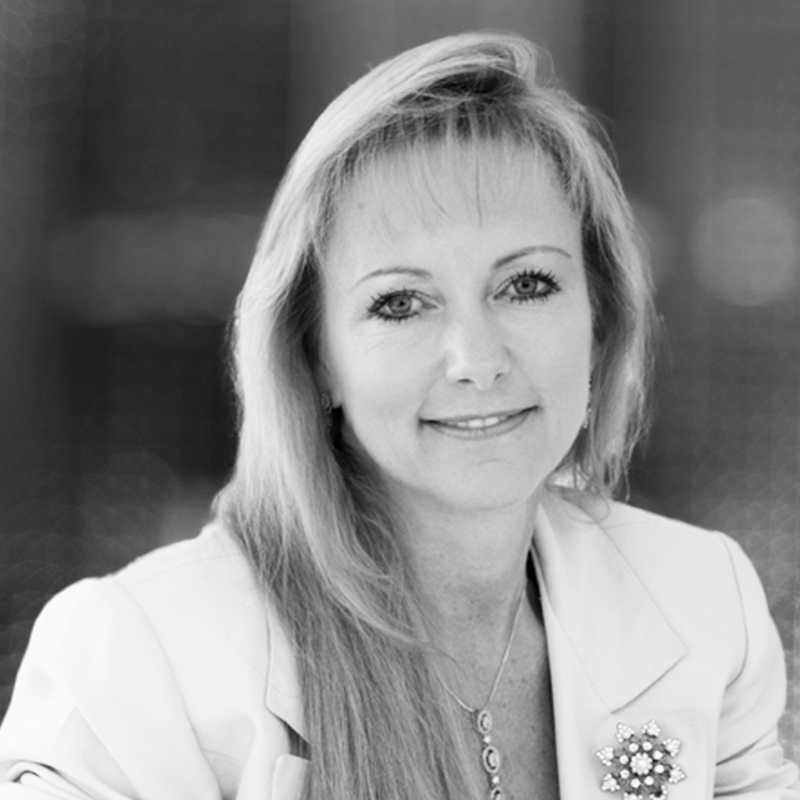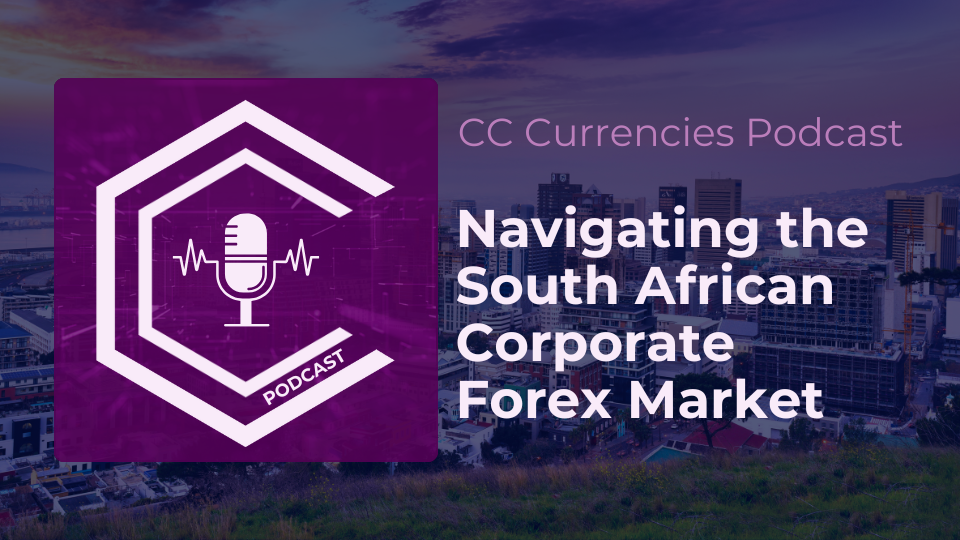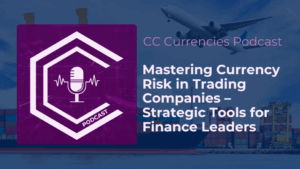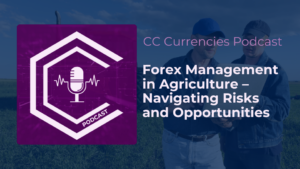Podcast
Navigating the South African - Corporate Forex Market
In this episode, we explore why South Africa’s corporate forex market is considered more mature than many of its global peers, despite operating in an emerging market economy. Sharon Constançon shares insights drawn from decades of experience, starting with her founding of Constançon Currencies in 1988.
The discussion delves into how local businesses have developed deep risk awareness in response to high interest rates, volatile currency fluctuations, and geopolitical challenges. Sharon highlights the structural maturity of the South African forex ecosystem, shaped by a layered market of brokers, advisors, and treasury partners.
Tune in to discover how South African corporates navigate regulatory constraints, mitigate currency risk, and why their proactive forex management culture sets an example for finance leaders worldwide.
Key Takeaways
As global market volatility becomes the norm, South African businesses offer a compelling case study in how to manage foreign exchange risk with sophistication and foresight. In this episode, Sharon Constançon unpacks the unique characteristics of the South African corporate forex market—where high interest rates, political instability, and a volatile currency have forced Finance Directors to evolve ahead of their global peers.
From early adoption of third-party forex advisors to the development of layered support systems, South Africa has built a mature market where companies are more engaged in currency strategy than many in the UK, Europe, or the US. Sharon highlights how this maturity is a product of necessity—and how it could serve as a model for businesses operating in less volatile but no less risky environments.
Key takeaways include:
- Market Maturity Rooted in History:
South Africa’s forex consulting ecosystem dates back to 1988. Over time, a network of authorised dealers, brokers, and specialist advisors has created a market with uncommon depth for an emerging economy. - Volatility Creates Vigilance:
The Rand’s unpredictable swings, paired with some of the highest interest rate differentials globally, have pushed businesses to be proactive and strategic in managing forex exposure. - Leadership Engagement is Key:
In most businesses, the Finance Director leads FX decisions. In SMEs, the CEO often takes this role, while larger firms benefit from dedicated treasury teams or outsourced specialists. - Greylisting Has Lingering Effects:
While the market anticipated the FATF greylisting, the longer-term concern is reduced foreign investment and gradual capital outflows, which could weaken the Rand further. - Global Lessons in Local Strategy:
South African finance leaders are a step ahead because they have to be. By embracing strategic forex management, companies can reduce risk, increase margins, and avoid the complacency often found in lower-volatility markets.
This episode is a reminder that currency risk isn’t something to fear—but something to master. South African corporates have shown that with the right strategies, tools, and expert support, even extreme volatility can be turned into a manageable—and sometimes profitable—advantage.
Understanding Market Maturity
- Why South Africa’s corporate forex market is more developed than expected
- Historical foundations from the 1980s to today
- The layered ecosystem: authorised dealers, brokers, and independent advisors
Drivers of Strategic FX Management
- The impact of high interest rates and Rand volatility
- Role of political and economic shifts: elections, inflation, COVID, state capture
- How these pressures shaped proactive risk practices in South African corporates
Leadership and Responsibility
- Who manages forex risk: Finance Directors, CEOs, Treasury leads
- Delegation in SMEs vs. structured treasury in large organisations
Greylisting and Investment Impacts
- Expected market response and investor withdrawal timelines
- Long-term risks to the Rand and confidence in South Africa’s regulatory environment
Lessons for Global Finance Leaders
- Cultural differences: passive vs. proactive forex attitudes
- What UK and European FDs can learn from South Africa
- The potential for 2%+ profit gains through informed FX management
Accessing Forex Expertise
- Gaps in advice from dealers and brokers
- The value of outsourced treasury partners who understand business cycles
Featured Article
As global markets fluctuate, the mature and sophisticated South African corporate forex market offers unique strategic advantages and serves as a benchmark in forex risk management and corporate treasury.
Defined by higher interest rates and economic volatility, this market presents distinct challenges and opportunities.
Host
Sharon, a forex risk management expert with over 40 years of experience, has been an entrepreneur since her twenties. As South Africa’s first female Chief Dealer, she pioneered innovative forex solutions, bringing strategic currency management to businesses involved in cross-border trade. As Chief FX Strategist, she leads a team dedicated to helping importers and exporters navigate South Africa’s complex exchange control regulations, optimise forex strategies, and protect their financial outcomes.
Throughout her career, Sharon has worked with over 200 international companies, helping them address the pitfalls in forex processes, implement effective accounting systems, manage transaction risks, and develop insightful management information. Her strategic approach ensures businesses are equipped to handle currency volatility and achieve financial stability.
In addition to her work in forex, Sharon is a respected voice in governance and boardroom dynamics. She lectures, conducts training, and speaks at global conferences, sharing her expertise on effective board practices and strategic risk management. Sharon’s ability to bridge the worlds of forex and governance makes her a sought-after leader, mentor, and educator in her field.
Volatile Markets? Protect Your Margins.
Facing currency volatility and exposure risks? We’ll help you optimise your FX strategy and safeguard your bottom line.
Schedule a consultation with our forex risk specialists today.
Transcript
TM: Good day everyone. Today we're Navigating the South African Corporate Forex Landscape. Join us as we explore emerging markets, regulatory developments, forex responsibilities, risk management, and much more. To help us unpack market movements shaping the South African corporate forex landscape, I am joined by Sharon Constançon, who is the strategy consultant at CC Currencies. To get us warmed up into our conversation, Sharon, can you tell us more about the South African corporate forex market at the moment?
SC: Thank you very much and I appreciate you spending some time with me today and enjoying the opportunity to share some of our knowledge with our listeners. So, thank you for joining us, everybody.
The South African forex market as I’ve described it, as being more mature than many of the corporate markets globally. The reason for this is that this [South African forex] market has got time and depth in it. If I go back to 1988, under the brand name of Constançon Currencies, I started in this market with a consulting style risk management business. That was the beginning of [where we are] today, which is quite a deep market in terms of having currency providers, brokers, and those that support corporates, so that, when they [corporates] deal with an authorised [forex] dealer, they are either getting better rates or they’re doing the right thing.
So, there’s various types of solutions that are offered by [corporate forex] market [consultants] over and above that offered by the authorised dealer. The big problem that an authorised dealer has, and a broker has is that they are not able to give a deep level of advice, they can say what the market is doing, but they can’t advise the organisation in the context of their own market. So, the [SA corporate forex] market has been having that interface with a third party [corporate forex consultants] independent of the authorised dealer for 40 odd plus years.
So, it’s a fair amount of time ago that this was started. So, that is why there’s greater depth. There are other reasons, which I think we will unpack a little bit later in the question, but maybe just to say that this market has history, more so, than what I see in European, UK and US markets.
TM: What you are saying is South Africa is an emerging market in forex terms. Why is the South African forex market more mature than corporate forex markets in other countries?
SC: Interesting, it is an emerging market as a country, as an economy, as a central bank, and its foreign exchange system, it is more an emerging market. Firstly, because we have such a high interest rate in South Africa, exporters are hugely benefited by it and importers are hugely negatively impacted by additional cost to their goods that are coming in, and the result of that is that the Finance Directors of corporates have needed to think very carefully about any of the hedging strategies, one to gain the discount, or the one to negate each of the cost each other out exactly, to balance it out. As a result of the fact that it’s such a high differential, the [SA forex] market has worried itself more about it.
The second reason is the Rand is known for its volatility. So, because it’s volatile on a regular basis, we then have got Finance Directors being a lot more interested in the impact it’s having on the goods exported or imported, and therefore have been a step ahead of trying to manage or hedge that risk.
If you look at the UK market, they consider it not a volatile currency, particularly going back a while, and the result of that is they’ve just bought whatever the spot is today, I’ll deal with, they don’t see it as being something they need to concern themselves about. So, that is the primary reason we’ve got more maturity in our Finance Directors in terms of forex.
TM: When did South African corporates begin to recognise their foreign responsibilities to their businesses especially in such a volatile environment?
SC: Well, Constançon Currencies was the first of its kind that started up in 1988, and that spawned a very deep [forex] market that exists today. The original company for Constançon Currencies still has an identity in the current market, it has been sold on a number of times. That started an interest in both those [forex companies] that were advisory, but equally those that were more broker led, so they [broker led] were the ones that are purely about the rate. Another depth in the market is where they [forex companies] are offering support to individuals [corporates] with the relevant exchange control requirements that go with it.
So, the area that we started in as Constançon Currencies was purely the corporate, international trade was the underlying, now number of companies are offering that [of which CC Currencies is one]. So, this [SA forex] market has that depth, it also has those that are brokers, which are about rate rather than advising on strategies. And then you have those that are supporting individuals [on a corporate level], such as CC Currencies.
So, we have as a result, quite a deep [forex] market. And there is a degree of infiltration of the UK style broker service that has come to the UK, and fits in that middle tier. So, the [market] is deepening even further with international competition coming into this market.
TM: Which executive roles typically lead on forex risk management in an organisation?
SC: In most businesses, that will be the finance director, if you take an average, the large majority of companies. If you are looking at the smaller end of companies, more SME type of environments, the CEO, invariably being the founder of the company, or being somebody who is directly responsible for the financial outcome, may get fairly involved in it as well. So, we do see that happening.
Then when you get to the larger companies, where there’s the affordability to have appointed a treasury person specifically for the purpose, you will see they will exist and report into the FD. So, it’s those three primarily, you do see in smaller companies, it delegated to debtors’ clerk, creditors clerk, import manager, export manager, so you do see it reduced or delegated into that support tier within the finance department as well.
TM: Earlier you mentioned that interest rates are higher in South Africa than those of the major trading partners. How could this have contributed to this increased maturity in South African forex market?
SC: Yes, it makes a difference. If you look [at] the difference between the US and the UK and interest rate is a quarter percent. The difference between South Africa and most of its trading partners can be anything up to 3 to 4%. If you look at 3 to 4% of additional cost eating into a 25% margin, that makes quite a substantial difference. You’ve got a fifth of your profit has disappeared.
So, I think the relevance is because of the volatility, high inflation, high interest rate, and the fact that the Rand tended to decline in value, as a trend over the last 40 years. Back then we were going through the Rev Econ, we were going through elections, the new democracy, we were going through political change, then we went through the state capture period. We’ve had issues around political issues, we’ve had inflation, economic issues, all of those have contributed very directly to a reduction in the value of the round. We have seen anything up to 25% increase value in the Rand within a year, as well as the same amount of decrease in the same 12 months, which makes it very different.
If you look at the first year of COVID 2020. We saw the Rand declined by 25% and improved by 25% during that period. So, the Rand is impacted by its own activities, and by emerging markets that impacted it as well – and you’ve got that of – ‘what is the Dollar doing versus everything else?’ – which obviously directly impacts the Rand as well.
TM: How has greylisting impacted the South African Forex market and foreign direct investments?
SC: Interesting enough, because it was expected, there wasn’t a massive reaction at the time. The Rand did weaken, we did see it improved from that level and go back to that weaken level since then. But we didn’t have a ‘’oh my goodness’’, that’s a big surprise and a massive devaluation of the Rand. That didn’t happen. But that’s because I think for two, two and a half years, three plus years, we were suspecting South Africa was not going to make the grade, and that the Greylisting was going to happen.
I think what will impact the Rand more is lack of new investment coming in because of the greylisting – and certain companies that have, or on maturity will take their funds out and not reinvest again, that is where we have a potential of seeing a decline, but fortunately that won’t all happen on the same day. So it happened over a year, and because it’s happening over a year, the impact therefore is not as acute.
TM: With the greylisting, eventually phasing out, hopefully next year, things will get a bit better.
SC: Well, let’s hope our credit rating improves, I don’t think we will get out of greylisting in less than two years, I know Mauritius achieved it, but most countries don’t always get the opportunity to be reviewed that quickly, or to be able to have matched expectations with enough historic evidence to prove that they are worthy of coming out of that space. So, I wouldn’t want to put people’s hopes up the greylisting is yesterday’s [issue]. I think it’s still a “tomorrow”.
TM: What clues can other countries and Finance Directors learn from the South African business culture and their approach to managing their corporate forex?
SC: So, when we say clues as the sort of learnings that we could take from an international market? Yes, I do think there is, because a lot of Finance Directors, if I look specifically at the UK market, we see it probably in certain other countries as well, particularly Europe, where they couldn’t be bothered with Forex. It’s something they believe that they can’t control which is true, but that they CAN manage. There’s a reluctance to learn, a reluctance to spend the time and effort. Equally, the reluctance, though, to spin the investment in getting somebody of a treasury nature to support them.
So, I think South Africa could be a wonderful case study that the UK, Europe, and I understand the US, but I don’t know that market as well, could learn from and could take some of those learnings and look at how they could put, and we believe is anything up to 2% plus, that can be put on the bottom line.
If you are managing your foreign exchange and you are mindful of things, and you take proactive action, and you correlate understanding the market with what your business cycles are doing. There’s easily 2% to be made without increasing risk – and that is the key part, we’re not increasing risk, because you’re doing nothing worse than you were doing first, or you’re doing something better in most cases. So, leaving yourself open to a volatile currency can really, really impact the business directly, positively or negatively, and typically, it’ll be the negative one you get upset about.
TM: Definitely, I mean, you are losing something, everybody gets upset about that. You've mentioned that there's now a market for forex, where do South African Finance Directors turn to for forex expertise?
SC: A very valid question, thank you. Theres is this market between the authorised dealer, there’s your forex treasury services just as a generic term, and then you have the corporate themselves. So, the authorised dealer is in a position, unless they have created a separate legal entity, that they are able to tell you what the markets [currently] doing.
Looking at the broker market, [that is] in between [the authorised dealer ] and forex services market – if they are a primary issuer of currency, they sit in the same position an authorised dealer does and they can tell you what the market is [currently] doing and tell you what the impact might be, but they don’t have the inherent knowledge about the company.
Then you have the advisors who are not primary issuers of the currency, they don’t touch the money – they are purely a treasury manager – outsource treasury manager of the organisation – almost like an employee that works remotely. There are a number of those kind of services in the market in South Africa, where you can turn to, of which CC Currencies is one of them. We are able to give an added value advice by saying “this is what the market is doing, there’s an element of it, that is very pertinent to your business because of an expectation – your business cycle – the fact that you are working on a just-in-time basis, or your lead times are 18 months.” I’m going to talk to company A and company B very differently [in those aspects].
We work for companies running from agriculture, who have a lot of challenges, and right through to your mining or your metals or [those companies] with long lead times in fashion, for example, have very long lead times, they’re planning 18 months in advance as to what they are going to sell a shoe or dress at, which is very difficult to predict very, very different to something that is going to get eaten in a month’s time, that kind of thing.
So, there is there are a number of these treasury outsourcers, that are able to support companies, by getting to understand the business – and that in itself is another whole podcast on ‘what is it you need to know’, so that you can make those decisions. I’m not sure, but there may be a question around that now in, this one [podcast], but the point is, you have to know the business, to be able to give advice, and you can’t be a primary provider of the currency.
TM: If I am a listener now, and decide that CC Currencies are the right people to contact, how do I get in touch with you, Sharon, to help me mitigate the risks in terms of forex and treasury management?
SC: There’s our website, cccurrencies.co.za, and then, if anybody is proficient on LinkedIn, there’s only one of me so there’s only one Sharon Constançon, you’ll find me [on LinkedIn] I can’t hide. So that’s another way of doing it.
We do have a [CC Currencies] site on LinkedIn and you’re able to pick us up there as well. We do put content out onto LinkedIn quite often when they’re pertinent issues of relevance for Finance Directors, you can do it that way. If not, you can just email us via the website. There’s a contact form on the website – cccurrencies.co.za.
TM: Great. Thank you so much for having us. That was Sharon Constançon from CC Currencies and we're looking at navigating the South African corporate forex landscape. In the next episode, we will be covering more on forex management. So, stay tuned. Thank you.
SC: Thank you for having me.














